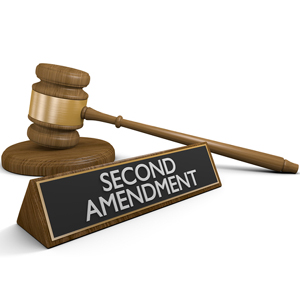Barrett's expansive view of Second Amendment could provide fifth vote to strike down gun laws

Image from Shutterstock.com.
U.S. Supreme Court nominee Judge Amy Coney Barrett has written just one Second Amendment opinion—a dissent—but the analysis shows that she is likely to go further to protect gun rights than her mentor, the late Justice Antonin Scalia.
Barrett “has a very expansive view of the right to bear arms and is pretty likely to be hostile to gun control efforts,” according to Adam Winkler, a professor at the University of California at Los Angeles who spoke with Bloomberg Law.
The National Law Journal and SCOTUSblog also covered Barrett’s Second Amendment views.
Barrett, a judge on the 7th U.S. Circuit Court of Appeals at Chicago, dissented in the 2019 decision Kanter v. Barr when a panel majority upheld a ban on felons owning firearms.
The felon challenging the law, Rickey Kanter of Mequon, Wisconsin, was banned from gun possession under federal and Wisconsin law after he pleaded guilty to one count of mail fraud. He had been accused of selling shoe inserts that weren’t approved by Medicare while maintaining that they had approval.
The panel majority reviewed the law using intermediate scrutiny, which requires a challenged law to be substantially related to an important government objective. The majority concluded that the gun possession bans was an important goal of keeping guns away from people convicted of serious crimes.
Barrett argued that legislatures have power to keep guns out of the hands of dangerous people but not all felons. She grounded her decision in historical practices.
“Founding-era legislatures did not strip felons of the right to bear arms simply because of their status as felons,” she wrote.
Historical evidence supports “a different proposition: that the legislature may disarm those who have demonstrated a proclivity for violence or whose possession of guns would otherwise threaten the public safety,” Barrett wrote. “This is a category simultaneously broader and narrower than ‘felons’—it includes dangerous people who have not been convicted of felonies but not felons lacking indicia of dangerousness.”
Scalia suggested that he wouldn’t have gone that far in his June 2008 opinion in District of Columbia v. Heller. The Supreme Court case held that the Second Amendment protects an individual right to own a gun for protection within the home.
Scalia wrote in Heller that the decision “should not be taken to cast doubt on long-standing prohibitions on the possession of firearms by felons.”
Erich Pratt, senior vice president at Gun Owners of America, told Bloomberg Law that Barrett’s approach indicates “a willingness to examine and apply the Second Amendment as written, by looking at its text and using history as a guide, instead of engaging in the judge-empowering interest balancing that has run rampant in the lower courts.”
Winkler, who also spoke with the National Law Journal, said Barrett’s historical analysis “disregarded a half-century of blanket bans on felons having guns.” He questioned whether Barrett’s narrow view of what counts as relevant history could also put at risk gun restrictions that are, in her view, more recent.
The Supreme Court declined to hear 10 Second Amendment cases in June. Four justices who commented on the decision to decline review appear ready to address gun rights issues, according to the National Law Journal. The four justices—Clarence Thomas, Samuel A. Alito Jr., Neil M. Gorsuch and Brett M. Kavanaugh—have raised concerns that Second Amendment rights are being applied too narrowly.
Only four votes were needed to grant review, but the four conservative justices may have been reluctant to hear a case because of fears that they did not have a fifth vote for their side, according to the National Law Journal.
If Barrett is confirmed, there could be five justices who will strike down gun regulations, the National Law Journal said, citing an opinion expressed by Joseph Blocher, a professor at the Duke University School of Law.
Write a letter to the editor, share a story tip or update, or report an error.


